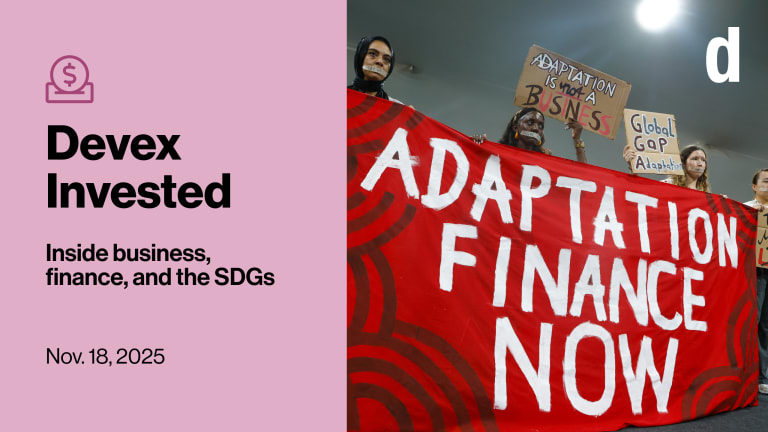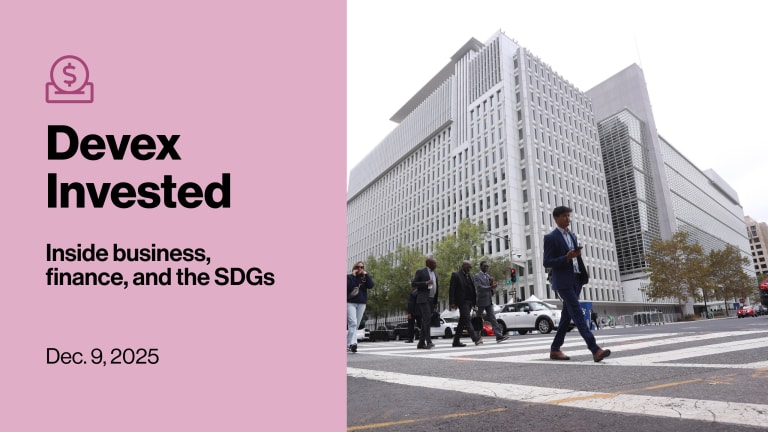Devex Invested: The road to the 2025 financing for development conference
Presented by MIT Solve

It’s been nearly a decade since the 2015 International Conference on Financing for Development and the Addis Ababa Action Agenda that emerged from it.
Many of the commitments and agreements made there are still a work in progress — and for some, that is a generous interpretation. Meanwhile the financing gaps are growing: Now an estimated $4 trillion a year is needed to meet development and climate goals.
Can the next iteration of that conference do any better?
Much rests on the shoulders of the next summit, slated for June/July 2025 in Spain. Almost half of the global population lives in countries where the government spends more on interest payments than on education or health. When those countries “turn to the global financial system for help, they find that it is unable to provide a global safety net to shield them from shocks. They find a system incapable of helping them forge stability or sustainability. They find a system that they had no hand in creating, no voice in shaping — and that remains unresponsive to their needs,” U.N. Secretary-General António Guterres said at the recent Financing for Development Forum in New York.
This is a preview of Devex Invested
Sign up to this weekly newsletter inside business, finance, and the SDGs, in your inbox every Tuesday.
The forum helped lay the groundwork for next year in Spain. I caught up with some U.N. officials working on the Fourth International Conference on Financing for Development to hear what we can expect to see on the agenda.
• The conference will be a venue to further push proposals related to reforming the global financial architecture — the systems and rules that govern the economy — on issues of debt, taxation, and aid, among other issues. Beyond those key areas, the goal will also be to focus on implementation and bringing new ideas and proposals to fruition, Shari Spiegel, acting director of the Financing for Sustainable Development Office in the U.N. Department of Economic and Social Affairs, tells me.
• One sticking point in Ethiopia — which almost derailed the final agreement — related to countries in the global south wanting more say regarding global tax, rather than laws being decided by the Organisation for Economic Co-operation and Development countries. While the U.N. General Assembly voted last year to develop a global tax framework, expect taxes to remain a key issue. Debt and debt restructuring will be on the agenda, but so will the cost of capital. Building a system that creates opportunities for borrowing at reasonable rates to unlock growth must be addressed, Spiegel says.
• It will also be a key test of whether nations can overcome heightened geopolitical tensions and reach an agreement. In a recent Devex podcast episode, U.N. Development Programme chief Achim Steiner called this “a dangerous moment” and said that while the conference will be about numbers and programs, it also needs to be about rebuilding confidence in one another and understanding the world’s interconnectedness, especially as donor nations have cut back.
Read: UN forum helps set agenda for 2025 financing for development conference (Pro)
+ Not yet a Devex Pro member? Start your 15-day free trial today to access all our exclusive reporting and analyses, invite-only events, the world’s largest global development job board, and more.
Africa Club
African leaders have signaled their desire to make a mark on the ongoing discussions about the global financial architecture, and can be expected to do so at the financing conference. In fact a new “Africa Club” group of regional banks has formed to advocate for Africa on related issues, Anthony Langat reports for Devex.
Africa Finance Corporation, African Export-Import Bank, African Reinsurance Corporation, and others make up the group that “will work to develop unique solutions and joint financing tools and instruments tailored to Africa’s unique developmental needs and pool resources for their effective deployment.”
And African leaders recently gathered in Nairobi, Kenya, to advocate for new funding for a large replenishment of the World Bank’s International Development Association, its fund for the world’s lowest-income countries. They said they want IDA to focus on job creation, energy and digital access, and building resilience. They would also like to see some operational changes that will make it more flexible and less complex.
Read: Can a new African Union alliance hasten global financial reforms?
Also read: African leaders set out IDA funding priorities at World Bank summit
ICYMI, tune into my podcast episode about what’s at stake in the IDA replenishment.
One big number
$15 billion
—That’s the U.S. dollar value of blended finance deals in 2023, a five-year high, according to a new report from Convergence. The report also found an uptick in large transactions over $100 million and more deals in general.
Related op-ed: A whale-watching moment in the blended finance ecosystem
Debunking debt-for-nature swaps
A European Commission-convened high-level expert group on scaling up sustainable finance in low- and middle-income countries delivered its final report last week.
It's a sweeping overview of everything from how to handle foreign exchange risk to the need for European development banks to rethink their "mandate, business models and incentive structures.” The full text is here.
One thing that caught our eye was the largely negative appraisal of debt-for-nature swaps, i.e., “where a country buys back part of its outstanding debt and replaces it by a new debt instrument, generating financial relief” and a commitment to conservation or climate objectives.
The experts wrote that the swaps:
• Are “very complex, lengthy, and costly.”
• Require “a disproportionately high amount of guarantee when compared to the fiscal space created ... and to the amount that goes into sustainable projects.”
• Could entail a serious “risk of greenwashing.”
• So far have been “too small to provide meaningful debt relief.”
• Risk a “negative impact on the country's perceived creditworthiness.”
Overall, they wrote, “although there are some advantages to DFNS, other approaches may be more effective in freeing-up fiscal space and bringing sustainable development benefits.”
Ouch.
ICYMI, check out our recent explainer on debt-for-nature swaps.
What we’re reading
How remittances are worth more than all development funding combined. [Devex Pro]
New form of bond emerges from Sri Lanka’s $13 billion restructuring talks. [Financial Times]
Japan announces bid to host the 2027 Asian Development Bank annual meeting. [The Japan Times]
Vince Chadwick contributed to this edition of Devex Invested.
Search for articles
Most Read
- 1
- 2
- 3
- 4
- 5








